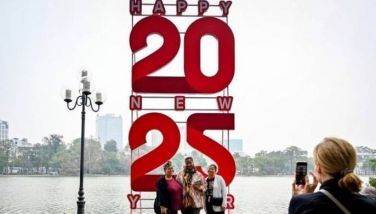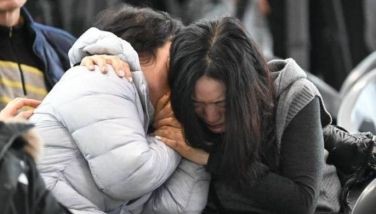Spanish court reviews custody of ex-Catalan vice president

MADRID — Former Catalan Vice President Oriol Junqueras vowed Thursday to abide by Spanish laws as he sought bail following his jailing during the restive region's recent drive for independence from Spain.
At the conclusion of his hearing into his jailing, Junqueras told a panel of judges in Madrid that he would not act unilaterally over the Catalan issue if he is released.
"He asked to be freed, to represent the people who voted for him, to be with his family, and to let him manage this situation which demands political maturity, which is the way of dialogue, the way of bilateral negotiations," Junqueras' lawyer Andreu Van den Eynde said.
"I believe the tribunal will be sensitive to his situation."
The three Supreme Court judges are expected to publicly pronounce their ruling as soon as Friday over whether to keep Junqueras in custody or grant bail. Release would ease Junqueras' way to take his oath as a Catalan lawmaker following a Dec. 21 regional election, and possibly become the new leader of Catalonia.
Junqueras faces potential rebellion, sedition and embezzlement charges for pushing ahead with the illegal independence bid for the wealthy northeastern region that flared during the fall. The crimes can be punished with up to three decades behind bars under Spanish law.
Both the public prosecutor and lawyers representing Vox, a small right-wing Spanish party, said the court should uphold the jailing because of the risk of further crimes being committed.
Vox's lawyer and secretary general Javier Ortega said the separatist politicians had staged a "coup d'etat."
"Proof is overwhelming, and we hope time will suffice to produce a conviction against all involved," he said.
Junqueras, the head of the left-republican ERC party, has already had two court appeals rejected.
With a population of 7.5 million, Catalonia generates a fifth of Spain's 1.1 trillion-euro ($1.3 trillion) economy. A series of opinion polls have shown that a majority of Catalans want the right to decide the region's future in a binding and legal referendum but that they are evenly divided over the merits of splitting from Spain.
The current tumult in Catalonia peaked Oct. 1 when the then Catalan government ran an independence referendum that was deemed illegal in terms of the Spanish constitution. Backers of independence claimed to have won the referendum even though pro-Spain parties boycotted the vote.
In response to the Catalan government's subsequent declaration of independence, Spanish Prime Minister Mariano Rajoy took direct control of the region, sacked the defiant regional government and called early regional elections.
Pro-secession parties, including a ticket led by the fugitive ousted president Carles Puigdemont and Junqueras' ERC, won most seats in the election.
But it remains to be seen if they can form government with some of their elected lawmakers and their presidential hopefuls either seeking refuge abroad or in jail.
The new Catalan parliament convenes on Jan. 17, and the first attempt to elect a government is expected to be held by the end of the month.
The secession parties hope to vote Puigdemont in as president but the former leader risks being arrested and jailed if he returns to Spain from Brussels, where he fled with four other members of his former cabinet.
Alternatively, Junqueras could be the separatists' candidate but he would need to be present for an investiture vote in the parliament in Barcelona, and would also need the votes of those in self-imposed exile or in jail.
Junqueras' lawyer has said that if the court did not agree to his release, he would seek to have him transferred to a prison in Catalonia, a base from where he might be better able to attend parliament whether as a lawmaker or president.
Around 20 supporters gathered on Thursday morning at the gates of the court in Madrid to call for Junqueras' release and urge authorities to free three other jailed Catalan separatists.
"It seems we are constantly treated with derision," said Gabriel Rufian, a national lawmaker with Junqueras' left-republican ERC party. "We think they should be moved to a prison nearer to their families in Catalonia."
- Latest
- Trending
































